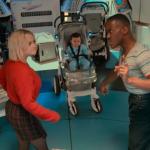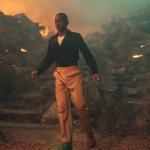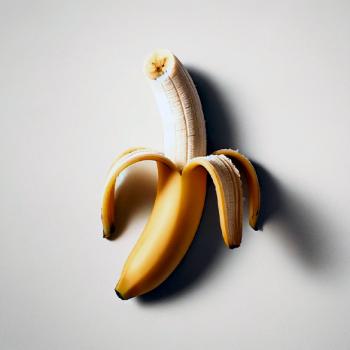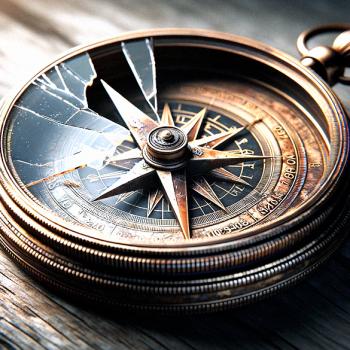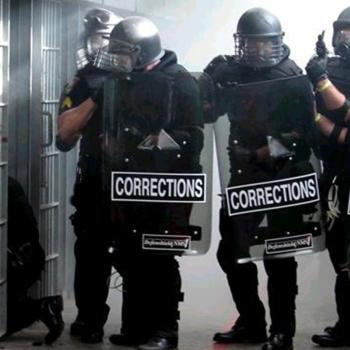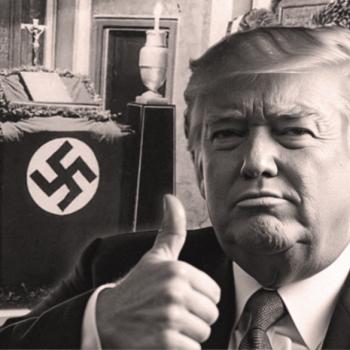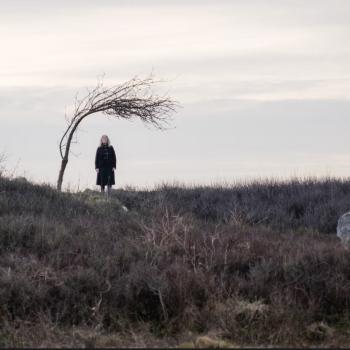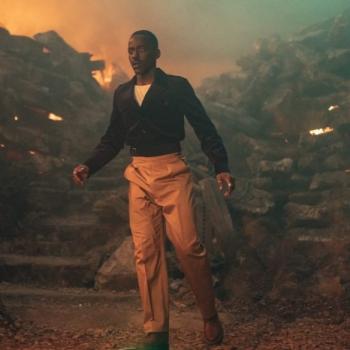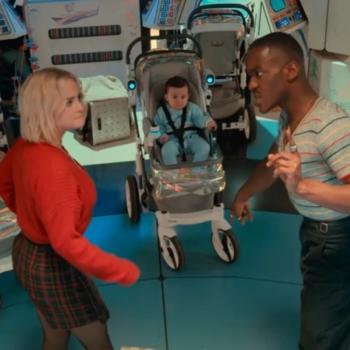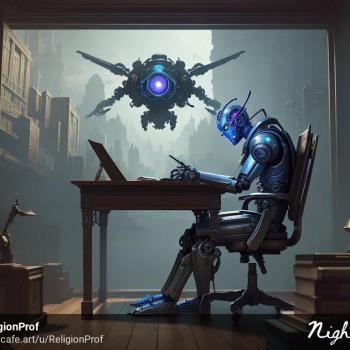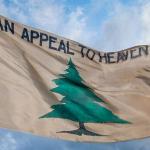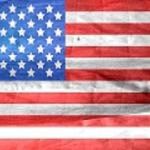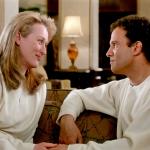The second of the new Doctor Who episodes is called “The Devil’s Chord.” The title and the opening sequence make reference to the notion that the church banned tritones because they were demonic. Although Doctor Who started out aiming to teach young people about history, it has regularly repeated pseudohistorical notions, and this most recent episode is an example of that. The fact that someone called the dissonance created by two notes a half step apart or by a diminished fifth/augmented fourth as “the devil in music” should not be taken as anything other than a metaphor. If you’re aiming for beauty then such dissonance needs to be kept to a minimum. That’s not theology, it is aesthetics based in physics.
Be that as it may, the premise of music being used to conjure, and the being (“the Maestro”) who appears starting to play the Doctor Who theme on the piano and then having it segue into the actual opening credits is effective.
For those interested in religion, the Doctor’s reference to everyone wanting to go to Mars or Bethlehem rather than see the Beatles is striking, and not just because of John Lennon’s quip that the Beatles had become “bigger than Jesus Christ.” (See my short story “Certainty” for time travel to Jerusalem in the first century. It was recently reprinted in Esoterica Magazine. Also don’t forget about when the Doctor said he went to the original Christmas.)
What happens next is hilarious, if also somber. The Beatles (and also Cilla Black) are seen singing songs, but not good ones. Even an orchestra is heard playing a dissonant version of “Three Blind Mice.” It turns out that it is not only music that has changed, but historical events are going awry too. The Doctor says, “If music is gone that means everything has changed.”
The Doctor and Ruby talk to Paul and John and there is a hint that there is a holy music they have an inkling of, but then we see glimpses of the Maestro and that’s it. No love songs, no dancing.
There is also a great open-ended discussion of whether the Doctor’s granddaughter escaped the genocide of the time lords.
Ruby plays the piano in an effort to bring the music back and we see people responding emotionally. Then the Maestro appears cackling the giggle of the Toymaker. The Doctor makes reference to the Maestro in religious terms:
“That thing must be part of the Pantheon. Oh God.”
“One trick – that’s all you get with the gods.”
We also get to see a world robbed of the beauty, artistic, and poetic that music and also mysticism make room for. The Doctor says, “Without music the human race goes sour.” If there’s no way to express a broken heart, humans go to war without even knowing why. We learn that the Maestro seeks aeolian tones, music produced without people. We also get a moving appearance of the Carol of the Bells. Hearing it leads the Maestro to ask, “How can a song have so much power, power like the oldest one?” Am I right that somehow that carol is inherently transcendent, haunting, full of power in the way the episode describes? Is there anyone for whom it doesn’t have that effect?
We then get a “music battle” (as the Maestro calls it) which has inherent religious overtones thanks to the scenario’s depiction in songs like “The Devil Went Down to Georgia” and the movie Crossroads. The Doctor seems to be winning but then messes up the last note. But then Paul and John come and play, as Paul recalls what he said, you put the notes together and it is like the most holy thing on earth. They discover the notes the Doctor had played and add the last one. Just as the so-called “devil’s chord” summoned the Maestro, the “secret chord” (perhaps the one that Leonard Cohen says “pleased the Lord”) reverses it.
The Maestro, before being banished, says “The one who waits is almost here.”
If you have read my blog for a while you’ll know that music is one of the major elements in my religious faith. It expresses aspects of life that go beyond words, and points towards transcendence, depth, and mystery. I don’t mean specifically religious music. Often it is music without words that touches my heart and brings joy and hope to my soul, as so often in this episode (apart from the bits of rock comedy).
Carol of the Bells is but one wonderful example.
See here for some past Doctor Who Beatles intersections. The actual Beatles appeared on the very early Doctor Who episode “The Chase.”
What did you think of “The Devil’s Chord”?


